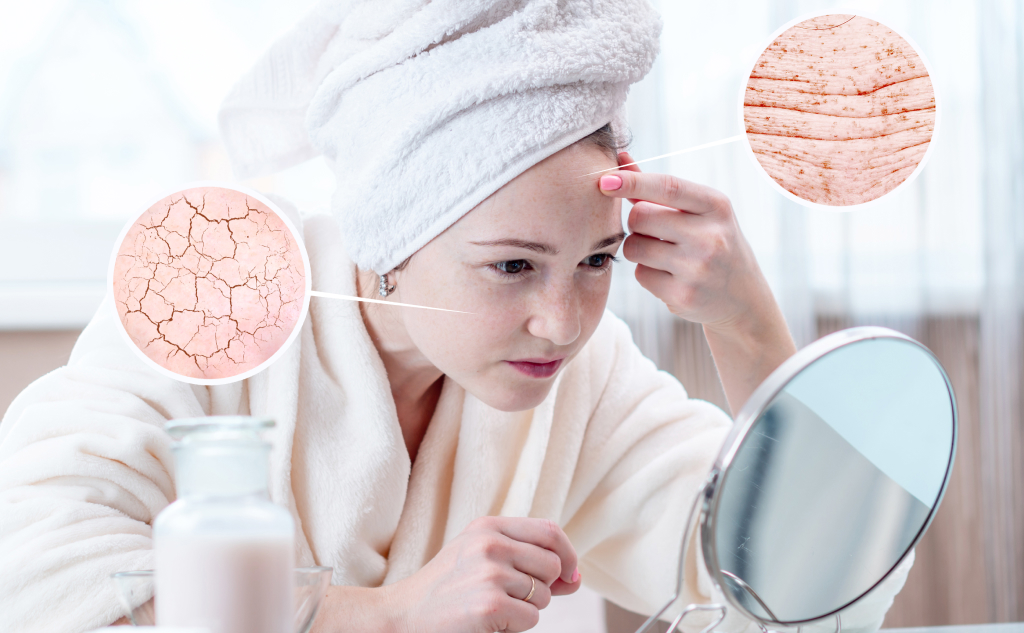
Reviewed by: Joshua M. Newman, M.D.
You can tell a lot about someone by looking at their skin—it’s our biggest organ, after all. And we’re not just referring to wrinkles and blemishes.
As Dr. Joshua M. Newman, a surgical and cosmetic dermatologist at AMARA in Venice, Florida, puts it, “Like the eyes, the skin can be a window to your health.” He points out that wrinkles and sunspots can show how much time someone spends in the sun, while dark circles under the eyes might suggest they’re not getting enough sleep.
But it goes even deeper than that. Skin can also be a clue to more serious health concerns, things we might not even be aware of. Let’s explore how paying attention to our skin can help us understand our bodies better and even lead to early detection of potential problems.

Table of Contents
Signs of Health Issues in Your Skin
Dry, Itchy Skin
Dry, itchy skin could indicate deeper health concerns like thyroid disorders, diabetes, or even lymphoma. Thyroid issues can cause dryness due to hormone imbalances, and diabetes can cause fluid loss. In rare cases, persistent dryness points to lymphoma. Staying hydrated and monitoring persistent dryness may help you catch these conditions early. Your skin might be sending you an important signal!
Pallor
Pallor is when your skin, especially on the face, lips, or inside your eyes and mouth, looks unusually pale. It could mean you’re low on iron or vitamin B12, signaling anemia or a nutrient deficiency. If you notice this, make sure to pinpoint the cause and get the right nutrients. Your body needs fuel to stay vibrant and healthy.
Jaundice
Jaundice is when your skin and the whites of your eyes turn yellow. It’s caused by a build-up of bilirubin in your blood and signals potential liver issues, like hepatitis or a blocked bile duct. If you notice these yellowish changes, get medical attention immediately.
Butterfly Rash
A butterfly-shaped rash across the cheeks and nose could be a sign of systemic lupus erythematosus (SLE), an autoimmune disease. Lupus can cause various symptoms and requires medical attention for management.
Acanthosis Nigricans
This condition causes dark, velvety plaques in body folds like the neck and armpits and can be associated with diabetes or internal malignancy.
Types of Skin Cancer
Skin cancer is incredibly common, but the good news is that most types are highly treatable if caught early. There are a few different kinds, each with its own quirks:
Basal Cell Carcinoma (BCC)
This is the most frequent type of skin cancer, and it usually pops up in areas that get a lot of sun. Think face, ears, neck – those spots that are always catching rays. BCC tends to grow slowly, and new treatments are making it even easier to manage.
Squamous Cell Carcinoma (SCC)
SCC also likes to appear in sun-exposed areas, and it can be a bit more aggressive than BCC. Regular skin checks and being sun-smart are key to catching it early.
Melanoma
This is the one that tends to cause the most concern. Melanoma can spread if not caught early, but thankfully, treatments have come a long way. And remember, melanoma isn’t always just about moles; it can show up in unexpected places like under your nails or even on the soles of your feet.
Read more about the different types of skin cancer and their treatment options.
Early Detection and Prevention
- Skin Self-Exams: Make it a habit to check your skin regularly. Look out for any new growths, changes in existing moles, or anything unusual on your skin. Early detection can make a huge difference.
- Sunscreen Use: Protect your skin by using a broad-spectrum sunscreen with an SPF of 30 or higher. This helps prevent UV radiation damage, which is the main cause of most skin cancers.
- Regular Dermatologist Visits: Seeing a dermatologist once a year for skin cancer testing is essential. These visits can help catch and treat any potential issues early on. It can even be as simple as a diet change.
Don’t know what to ask your doctor about your skin cancer diagnosis? Here are the Top 10 Questions to Ask Your Dermatologist About Skin Cancer!
Taking the Next Step
If you notice changes in your skin, don’t panic – most skin issues are treatable and aren’t signs of severe illness. Even if you need treatment for a skin cancer diagnosis, it doesn’t always have to mean surgery. But, it’s important to schedule an appointment with a board-certified dermatologist to get a proper diagnosis and treatment plan. Your skin might be trying to tell you something, and it’s best to listen.
To ensure you’re getting the best care, book an appointment with AMARA. Taking action now can make a big difference in your overall health and peace of mind.
While we strive to provide accurate and up-to-date information, medical knowledge is constantly evolving, and new research may change the nature of certain conditions. Please remember to consult with a healthcare professional or dermatologist for proper diagnosis, treatment, and guidance regarding skin cancer or any other medical condition.

